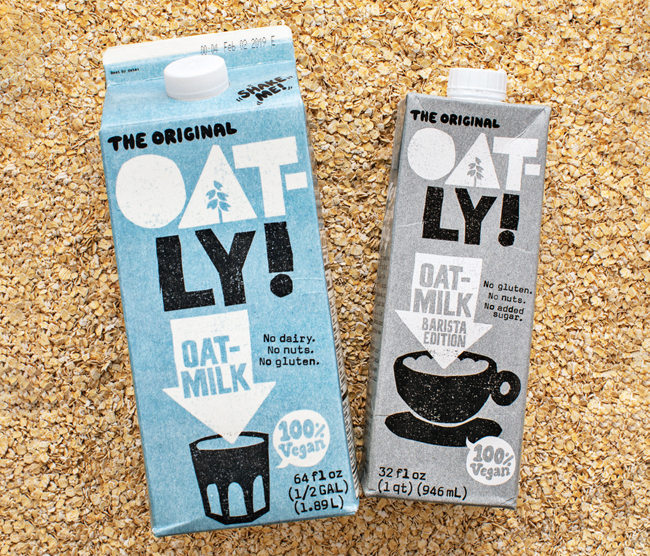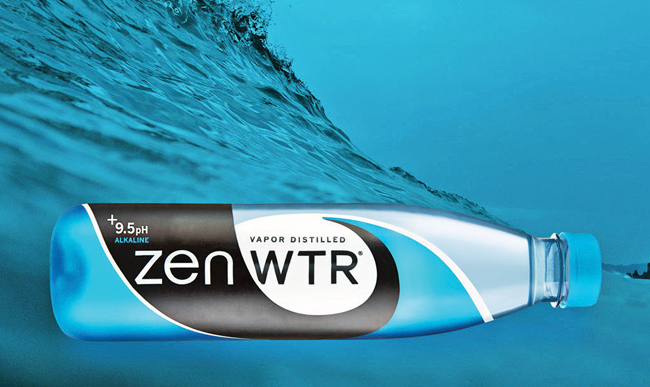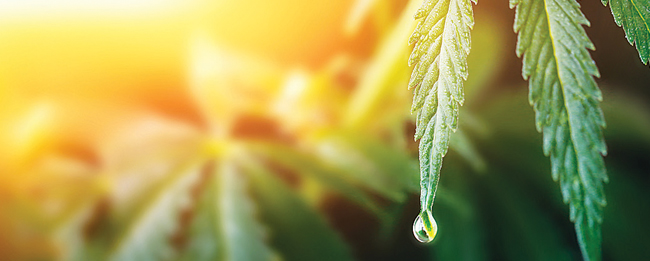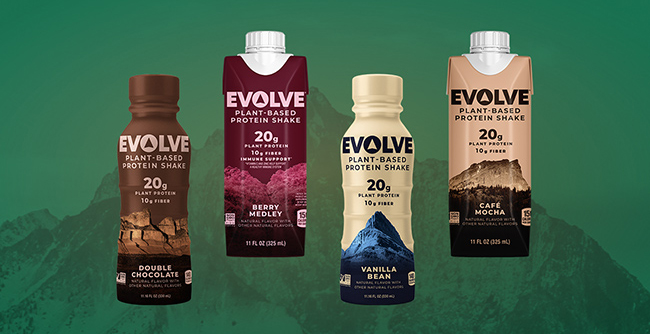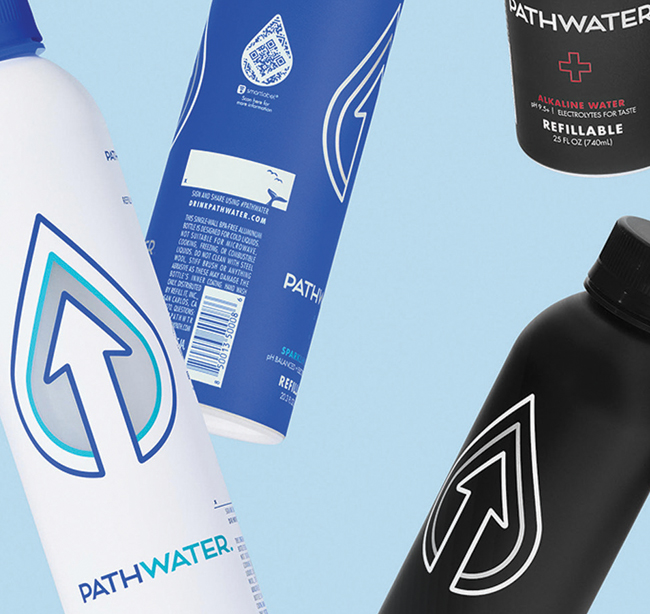Bevscape: The Latest Beverage Brand News
Oatly Reveals Revenue Gains, Mounting Losses in IPO Filing
Oat-based product maker Oatly (Oatly Group AB) has officially filed for an initial public offering.
The much-heralded Swedish company, which entered the U.S. in 2017, has emerged as leader in the $2.5 billion plant-based milk space, which now represents 15% of the milk category according to data from the Plant Based Foods Association and the Good Food Institute. Oatly generated around $421 million in revenue last year, according to paperwork filed with the U.S. Securities and Exchange Commission (SEC). The brand’s success — including a nationwide retail partnership with Starbucks — has helped push oat to become the second most-popular non-dairy milk in the U.S. this year, and has given Oatly momentum as it moves into other food categories such as ice cream and yogurt.
Along the way, it has attracted attention and investment from celebrities including Oprah Winfrey and Natalie Portman, as well as global investment firm Blackstone. Oatly products are currently sold in 7,500 retail locations and approximately 10,000 coffee shops nationwide.
In 2020, revenue increased 106.5% year-over-year, outpacing the 72.9% growth from the year prior, with U.S. revenue representing $100 million, according to SEC documents. Citing Nielsen data, the company reported that retail sales in the U.S. grew 182% year-over-year. Gross profit for 2020 was $129.2 million, while the company reported a loss of $60.4 million for the year (up from $35.6 million in 2019), which it said reflected “our continued investment in production, brand awareness, new markets and product development.”
“Going forward, we intend to continue to invest in our innovation capabilities, build our manufacturing footprint and expand our consumer base, all supporting our growth trajectory,” the company stated.
Outside the U.S., Oatly has focused on expanding its presence in Asia through food service, including a branded partnership with Starbucks China in over 4,700 stores. As of December, Oatly products were in 11,000 coffee and tea shops and more than 6,000 retail and specialty shops across the continent, and the company is planning to open two additional production facilities later this year in Singapore and Maanshan, China. The brand has also found traction online: e-commerce accounted for 21% of revenue in China for 2020.
The documents also reveal that Oatly has an agreement in place for an additional listing on the Hong Kong Stock Exchange if it generates more than 25% of revenue from sales in the Asia-Pacific region for two consecutive fiscal quarters. The company’s largest shareholder, Nativus Company Limited, is a subsidiary of China Resources Verlinvest Health Investment Ltd., a 50-50 joint venture between Belgian firm Verlinvest SA and Blossom Key Holdings Limited
The documents also make reference to future potential challenges to Oatly’s supply chain. Acknowledging that “financial performance depends in large part on our ability to arrange for the purchase of raw materials in sufficient quantities at competitive prices,” the company stated that neither supply nor price were “assured” and that any disruption amongst its five global oat suppliers could cause delays or shortages. “We may have general difficulties in obtaining raw materials, particularly oats, due to our high quality standards,” the company stated.
Oatly also sources a variety of enzymes used in its production process, including a specific type for its Barista Edition. In the filing, the company noted: “While we believe we maintain a good relationship with this supplier, there can be no assurance that we will be able to continue purchasing the necessary enzyme from this supplier on favorable terms, or at all, in the future.”
The impact of climate change looms as a potential threat as well. In addition to dealing with increased frequency of extreme weather and natural disasters, the company “may also be subjected to decreased availability of water, deteriorated quality or water or less favorable pricing for water.”
Ramping up production will be a key part of serving rising global demand for oat milk, as reported in the documents. Following the opening of an additional four facilities currently in development in Utah, Singapore, China and the United Kingdom, the company projects it will increase output to 600 million liters of finished oat base in 2020, up from 301 million liters last year. That will increase to 1 billion liters by 2022 and 1.4 billion liters by 2023. Just over half of Oatly’s 52% products were produced through co-packing and complete outsourcing in 2020, with 24% through a hybrid model and 24% through the company’s own end-to-end manufacturing. In March, Millville, New Jersey-based Innovation Foods announced that it is building a new $45 million processing and packaging facility to produce plant-based aseptic and extended shelf life beverages for the Swedish oat milk maker.
ZenWTR Reveals Roster of Celebrity Investors
Marking its unofficial transition from soft launch into wide release, ZenWTR has revealed its slate of celebrity investors ahead of a retail push that aspires to take the brand into 50,000 locations by the end of the year.
The list of existing backers, announced in April, includes names ranging from hip hop stars (Lil Jon, 2 Chainz) to Academy Award winners (Juicy J, Anne Hathaway) to full-time celebrity entrepreneurs (Paris Hilton, Khloe Kardashian). The roster also includes actors Jessica Chastain and Zoe Saldana; pro athletes Tristan Thompson and Julio Jones; singer Ellie Goulding and sisters Erin and Sara Foster.
“Plastic-free is best when possible, but there are times when it’s not an option,” Hathaway said in a press release. “It’s something that keeps me up at night so I’m excited that I have decided to invest in ZenWTR. In our world where plastic water bottles are seemingly inevitable — and a very important necessity for some — I’m so relieved there is now a more sustainable option that, over time, will keep a tremendous amount of plastic from reaching and polluting the ocean.”
While there are currently no plans to integrate individual investors into brand marketing, the group has already been helping ZenWTR amplify its message through its collective social media reach of over 266 million, according to ZenWTR CMO Eric Berniker.
“It’s not an endorsement or a sponsorship,” he said of the celebrity cohort. “They’re behind it and they are very active.”
Founded by Lance Collins, ZenWTR has sought to turn one of bottled water’s biggest criticisms — its outsized contribution to the global plastic waste footprint — into an asset by using bottles made from ocean-bound plastic, with the goal of rescuing 50 million pounds by 2025. According to the company, every 1 liter bottle of ZenWTR is made from up to five bottles of recycled ocean-bound plastic, defined as “plastic found on coastlines and waterways that feed into the ocean in a country or region lacking waste management infrastructure and collection incentives.” The company also contributes 1% of overall sales to organizations that focus on ocean conservation.
Berniker said the brand is hoping to drive awareness and education as it seeks a bigger share of the water shelf. After starting in around 5,000 accounts in 2020, the company is targeting 50,000 stores for this year, spread across channels and retailers including Whole Foods, Target, Kroger, Quik Trip and others in 1.5L, 1L, 700ml sports cap and 500ml formats. In select regions, ZenWTR has partnered with both non-alcoholic DSD distributors as well as affiliates of Molson Coors, also an investor in the brand.
ZenWTR isn’t the only water brand adding star power to its cap table. In March, Toronto-based Flow Water announced NBA All-Star Russell Westbrook had invested in the company (joining the likes of existing stakeholders Gwenyth Paltrow and Post Malone), while other eco-friendly water brands like JUST Water (Will and Jaden Smith) and PATH (Vernon Davis, Guy Fieri) have also attracted their share of celebrity backers.
“What’s resonating with consumers and celebrities alike is just how easy it is to make a positive change with ZenWTR to reduce ocean pollution,” Berniker said. “Changing consumer behavior is one of the hardest things you can do, and that’s the beauty of ZenWTR. We aren’t asking the consumer to do something different or use a different format.”
Report: Variety, Value Fuels Optimism for U.S. Cannabis Bevs
Although growth has been slower than some have predicted, the U.S. cannabis beverage market is gathering steam as consumer trial rates and basket penetration increase, according to a recent study by market research group Headset.
Overall, the category has maintained around 1% share of total recreational cannabis sales, dipping below 0.9% during the outset of the COVID-19 pandemic before rebounding into growth in Q3 2020. Yet analysts for Headset indicated that “for the first time in a long time” they are “bullish” on cannabis beverages, which the group has been tracking since 2015. “Between advancements in THC infusion technology, and a myriad of new brands catering to the occasional, low-dose consumer, there is a lot of reason to believe in the growth potential of this category,” analysts wrote.
To support its conclusions, Headset highlighted the segment’s performance in several key metrics. First, basket penetration in the category has increased from 1.6% in January 2018 to 2.8% in February, an indication that consumer trial rates are gradually increasing. The percent of U.S. cannabis customers who have purchased beverages is also trending upwards, rising from 5.7% in 2018 to 6.5% in 2020; just three months into 2021, that figure is at 5.4% and projected to finish at around 7% at the current trajectory.
However, data collected by Headset indicates that beverages are still seeking their place within broader cannabis consumption habits. Only 23% of total beverage baskets contained just beverages, suggesting that drinks are more often considered add-on purchases rather than trip-drivers. However, 34.4% of beverage baskets also contained edibles (more than any other category) and only 2.4% contained capsules (the lowest of any category), indicating that consumers are looking for a range of experiences and formats within orally ingested products.
What products those consumers are able to find in stores depends on where they live: the report is based on recreational sales data from California, Colorado, Massachusetts, Michigan, Nevada, Oregon (including medical) and Washington. In California, the market is enjoying both growth and stratification, with a broad field of brands helping to diversify the category. In 2018, 32% of sales went to the category’s top three brands at the time; as of 2020, that figure had dropped to 22%. But there’s more dollars to spread between them: California reported $15.5 million in beverage sales for January 2021, nearly six-times the amount from the same period in 2018.
With a greater breadth of options to choose from, both new and experienced cannabis consumers have multiple entry points to the category. In California, where low-dose ‘social tonic’ CANN has emerged as the top-selling beverage brand, sales of products with 12mg of THC or less represent over 1/3 of the total market, split between 15mg (9.9%), 10mg (15.7%) and 12mg products (9.9%).
“Currently, the majority of sales is driven by the higher dose products,” said Cooper Ashley, data analyst at Headset, in an email. “However, the low or ‘micro-dosed’ segment of the beverage market is growing at a much faster rate. For example, from 2020 to 2021 YTD the proportion of sales to beverage products with 100mg or greater serving sizes grew from 58.7% to 59.8%, a relative increase of only 1.9%. The sales share to products with serving sizes of 5mg THC or less grew from 16% to 18.5%, a relative increase of nearly 16%.”
The breakdown also sheds some insight into how consumers in the Golden State interpret value in this category. CANN (2mg THC) has been one of the industry’s most highly visible brands through aggressive expansion, positioning as an alcohol replacement and endorsements from celebrity investors, despite having an average price per milligram of THC nearly eight times higher than the market average. In contrast, Keef Cola, California’s third best-selling beverage brand, offers value-priced 10mg and 100mg drinks at just slightly above market average.
Furthermore, the report found that female customers are more likely to spend more on beverages than their male counterparts across all age groups, suggesting that brands have room to tailor dosage and use occasions to specific demographics. According to Cooper Ashley, data analyst at Headset, the market should continue to see bigger gaps between average price per mg of THC in beverages.
“Brands like CANN are selling more than 2mg of THC in each beverage, they’re a lifestyle brand attempting to sell an experience,” said Ashley. “We expect to see the pricing landscape in cannabis beverages look just as diverse the beer or wine market in due time.”
Outside of California, the low-dose beverage market is changing as well: drinks with 5mg of THC or less grew from 14.4% to 18.5% of category sales from 2018 to 2021 YTD, while products in the 20-50mg range fell over 10% during that period. Yet nationwide, the biggest beverage category (59.8%) remains products with 100mg THC or more. Under federal law, all legal cannabis products must be produced in-state, meaning each individual market is being developed at a different pace and being influenced by different factors. In Washington, for example, 100mg-plus brands hold approximately 90.3% of the cannabis beverage market.
“With 9 out of every 10 dollars being spent on Beverages going to a 100mg product, there isn’t much room for anything else. Or perhaps this indicates a tremendous opportunity for Washington Beverage brands as, in contrast, sales to products of 12mg or less make up more than a third of the California Beverage market,” analysts wrote.
That cohort of lower-dosed products — which also includes drinks from Lagunitas Brewing, another one of California’s top-sellers — is growing at the same time as alcoholic “hard seltzers” continue to explode in popularity. Riding that same interest in intoxicating alternatives to traditional alcohol, the report noted that Cann, Lagunitas and others have emphasized their positioning as providing a booze-free buzz, while beer brands (Pabst Blue Ribbon) and winemakers (Rebel Coast) have also sought to get in the action.
“If the future of cannabis seltzer is as bright as its alcoholic inspiration, there will be room for quite a few brands going forward,” read the report.
Rebranded Evolve Line Pushes Pepsi Further into Plant-Based Space
Amidst some of its recent high-profile moves in energy drinks and sparkling water, PepsiCo’s $465 million acquisition of Muscle Milk’s parent brand Cytosport in 2019 may not have grabbed the same level of attention. Yet as the conglomerate continues to expand and refine its breadth of better-for-you beverage options, one of the other less-heralded brands included in that deal may have a critical role to play.
In April, Evolve, Cytosport’s plant-based protein platform brand, debuted a new brand identity and reformulated products across its range, beginning with its core shake line. With dairy-based Muscle Milk experiencing double-digit sales declines, according to Nielsen data, Evolve is positioned to be Pepsi’s primary growth driver in plant-based protein, a space that includes players like OWYN, Koia, Orgain and Aloha.
“We are seeing plant-based protein just continue to take off,” said Laura Gardner, Senior Director, Active Fitness Portfolio at PepsiCo. “PepsiCo is really making a commitment to lean-in here and to bring plant-protein to consumers in a really accessible way.”
Evolve’s updated lineup includes a line of pea-based protein shakes in four flavors: Double Chocolate, Berry Medley, Vanilla Bean and Cafe Mocha. Each contains 140-150 calories, 4-5 grams of sugar and 20 grams of protein per 11 oz. bottle or Tetra Park carton. Beyond “upping the bar on taste,” according to Gardner, and updating the individual SKU names, the biggest change with Evolve’s reformulation comes with the addition of 10 grams of fiber per serving (up from 1 gram). The rebranded line is rolling out now across channels, including c-store/gas (Circle K, 7-Eleven, Speedway), mass retail (Walmart) and grocery.
The brand’s new visual identity leans heavily into outdoor sports and lifestyle, both on its labels and in the advertising campaign that kicked off in April. The bottles feature images of National Parks like Big Bend and Glacier National Park, an extension of the brand’s ongoing relationship with the National Park Foundation, which will continue with a national advertising campaign and sweepstakes offering consumers a change to win a trip to a park.
“That relationship is going to be really key as we build this brand,” said Gardner. “Thinking about the sustainability story that Evolve has — we’ve made a meaningful commitment thinking long term. We are not there [yet], but part of what makes this brand great is that it’s a progressive, future-thinking brand.”
Evolve’s new look will extend to its bars and powders later this year; the latter products have been reformulated to match the nutritional content of the shakes. The bars will also undergo changes ahead of their reintroduction, though the company didn’t offer details.
For Pepsi, Evolve’s rebrand is another in a series of steps towards furthering its interests in plant-based protein. The soda giant inked a product development deal with Beyond Meat last year, while Health Warrior, acquired in 2018, markets its own range of powders and bars. Pepsi’s interest mirrors that of consumers: According to data from Mintel, 55% of Americans are trying to add more plant-based food to their diet.
PATH Building Bridge Beyond “Water” With New Identity, Investors
Looking to take the company to the next stage in its mission to help the environment through sustainable packaging, bottled water maker Pathwater has rebranded as PATH, a move that comes as the company completes a celebrity-backed funding round and rapidly scales its retail footprint.
According to PATH co-founders Ali Orabi and Shadi Bakour, the company dropped “water” from its corporate name to reflect a broader focus on environmentally friendly innovations outside of beverage. The company’s core line of purified waters in reusable aluminum bottles will remain labeled as “Pathwater” as it branches into new product types outside of packaged beverages focused around water and sustainability including technology plays set to be announced in the near future.
“The whole point of PATH is that we want to become more of a brand that has an end-to-end solution, and not just a bottled water,” Orabi said. “Yes, we are a bottled water brand currently, but we want to become more of the Apple of the industry. You don’t say Apple iPhones or Apple Mac, it’s just Apple.”
Founded in 2015, PATH has focused on disrupting the bottled water space with an anti-PET message, encouraging consumers to refill its bottles in an effort to save the environment. Last year, the company expanded beyond its single SKU still bottled water with new sparkling and alkaline varieties. Most recently, it has introduced accessories for its bottles, including nylon sleeves and swing caps, sold on its website.
Over the past year, PATH has brought in a number of celebrity and athlete backers in recent months through a bridge funding round, including comedian Kevin Hart (whose beverage interests also include C4, Ellis Island Tea and previously Liquid I.V.), Ryan Seacrest, professional gamer Ninja, actor Sterling K. Brown, singer Becky G, NFL stars Mohamed Sanu and Frank Gore, MLB first baseman Luke Voit and journalist Adam Housley. The sum of the bridge round was undisclosed.
According to Bakour, the celebrity backers will be highly involved in promoting the brand through social media as well as television and other media appearances. The company is also introducing collaborative bottles for many of its partners, including Ninja and Seacrest.
The new backers join a roster of previous celebrity investors in the company, which include NFL tight end Vernon Davis, reality TV chef Guy Fieri, basketball player Festus Ezeli and actress Tamera Mowry. The company previously closed a Series A funding round and Bakour said the company is working towards finalizing a Series B round in the near future.
“Most importantly, is that people like Kevin Hart realized that they want to join a movement that is actually making a difference,” Orabi said. “It’s not just about new packaging and with all of our investors, they’ve joined, basically, a movement. They believe in what we do and what we’ve accomplished and what we have to offer to the world.”
The new investment comes as PATH scales its flagship water business nationwide, expanding its retail footprint to over 20,000 doors, up from 3,000 stores at the beginning of 2020. Among the chains the brand has added are convenience and gas retailers including Speedway, Tops, QuikTrip, Circle K, Chevron and AMPM, as well as Jacksons Food Stores, natural grocer Wegmans, and Rite Aid. The brand will roll out its Still and Alkaline SKUs into Sprouts and CVS stores in Q2. Citing internal data from IRI, the company said it was the fastest growing brand in the convenience channel in 2020 for brands with dollar sales over $1 million.
According to Orabi, PATH has also turned to co-branding as a major revenue driver, creating custom bottles for corporate customers including NBC’s The Tonight Show, Lockheed Martin, State Farm Insurance, Four Seasons hotels, the Grand Wailea Maui resort in Hawaii, Orangetheory Fitness, RE/DONE, 1 Hotels, Empire, Bun Mee and Napa Farms Market. Many of these partners, including Orangetheory and 1 Hotels, have banned single use plastic, Orabi noted.
The focus on co-branding opportunities follows a period of upheaval for PATH’s on premise and travel channel sales amid the COVID-19 pandemic, Orabi said. Prior to March 2020, one of the brand’s largest buyers was the San Francisco International Airport and the company also had a heavy presence in food service.
“San Francisco alone was doing about 9,000 bottles per day,” Orabi said. “So going from that to zero, we have to expand our core brands footprint immediately, so we just added more gas to the fire when it came to co-brands.”
To support the growth in retail and co-branding, PATH has built out its sales team with beverage industry veterans from Nestlé, Icelandic Glacial, The Coca-Cola Company and Red Bull, Bakour noted.


Receive your free magazine!
Join thousands of other food and beverage professionals who utilize BevNET Magazine to stay up-to-date on current trends and news within the food and beverage world.
Receive your free copy of the magazine 6x per year in digital or print and utilize insights on consumer behavior, brand growth, category volume, and trend forecasting.
Subscribe